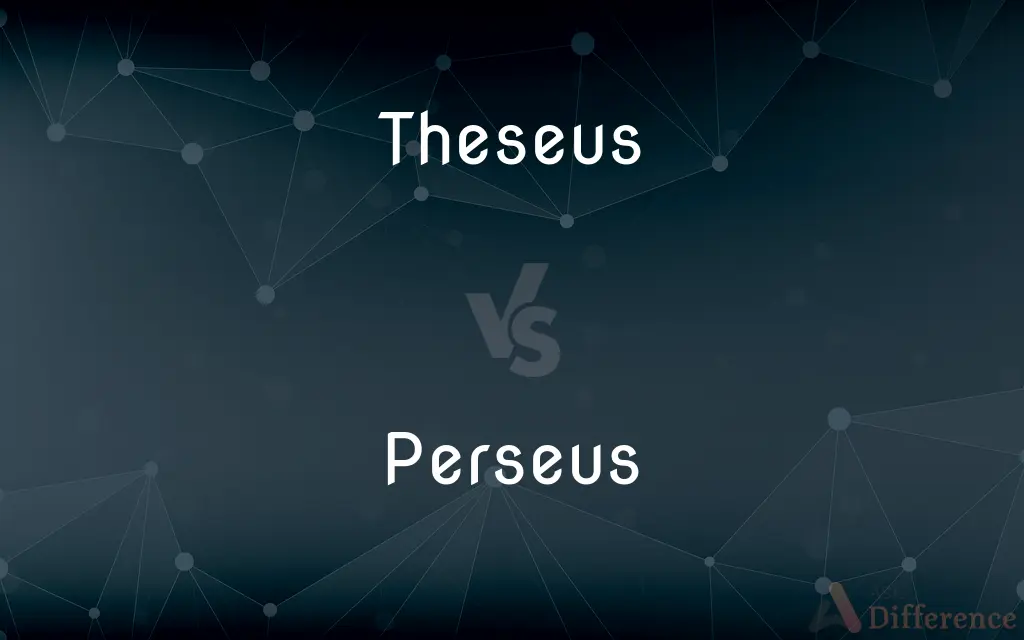Theseus vs. Perseus — What's the Difference?
By Tayyaba Rehman & Fiza Rafique — Updated on March 10, 2024
Theseus is known for his role in defeating the Minotaur in the Labyrinth, while Perseus is famous for beheading Medusa.

Difference Between Theseus and Perseus
Table of Contents
ADVERTISEMENT
Key Differences
Theseus is celebrated in Greek mythology as the founder-hero of Athens, symbolizing the unification of Attica, while Perseus is one of the earliest heroes, known for his exploits and the slaying of monsters such as Medusa. Theseus's story is marked by his journey through various trials, culminating in the slaying of the Minotaur in Crete, which was a feat that required cunning, bravery, and the help of Ariadne. Perseus, on the other hand, undertook his quest to behead Medusa, a Gorgon with snakes for hair whose gaze could turn men to stone, as a challenge to save his mother and fulfill a prophecy.
Theseus's adventures often reflect his role in the development and protection of the polis, showcasing his intelligence and political acumen. His deeds, such as defeating bandits and monsters, are seen as metaphors for the establishment of social order. Perseus's adventures, however, are more focused on overcoming supernatural challenges, highlighting themes of fate, divine intervention, and heroism against seemingly insurmountable odds.
While Theseus is linked with the city of Athens and its civic ideals, embodying the virtues of democracy and justice, Perseus's legacy includes the founding of Mycenae and an emphasis on the heroic, individual quest against evil. This difference highlights the varied nature of heroism in Greek mythology, with Theseus as a symbol of civic virtue and Perseus representing the triumph of the individual.
Theseus's legend includes complex relationships, such as his interactions with Ariadne, Phaedra, and his father, Aegeus, which illustrate the complexities of human emotions and familial bonds. Perseus's story, while also featuring significant relationships, such as with his mother Danaë, tends to focus more on his divine lineage and support from gods like Athena and Hermes, underscoring the importance of divine favor and guidance in his quests.
Both heroes' stories culminate in their successful return and the establishment of lasting legacies; Theseus through his rule in Athens and contributions to its institutions, and Perseus through his descendants, including Hercules, showing how their heroic deeds continued to influence Greek culture and mythology.
ADVERTISEMENT
Comparison Chart
Main Achievement
Defeating the Minotaur
Beheading Medusa
Symbolizes
Unification of Attica, civic virtues
Heroic quest, divine intervention
Associated City
Athens
Mycenae
Key Relationships
Ariadne, Phaedra, Aegeus
Danaë, Andromeda, Zeus
Themes
Social order, democracy, justice
Fate, divine support, heroism
Compare with Definitions
Theseus
Hero of Athens who unified Attica.
Theseus is celebrated for integrating smaller communities into Athens.
Perseus
First of the Greek mythological heroes.
Perseus's quest to slay Medusa marks the beginning of Greek heroic tales.
Theseus
Slayer of the Minotaur.
Theseus navigated the Labyrinth to kill the Minotaur and used a ball of thread to find his way out.
Perseus
Bearer of Medusa's head.
Perseus used Medusa's head as a weapon long after her death.
Theseus
Known for defeating bandits.
Theseus rid the roads of dangerous criminals, making travel safer for his people.
Perseus
Descendant of Zeus.
Perseus's divine lineage granted him strength and protection in his endeavors
Theseus
Associated with complex familial relationships.
Theseus's abandonment of Ariadne on Naxos reflects the tragic aspects of his character.
Perseus
Founder of Mycenae.
Perseus is credited with the establishment of Mycenae, a major center of Greek civilization.
Theseus
Symbol of justice and democracy.
Theseus's reforms in Athens are seen as the foundation of democratic principles.
Perseus
Receiver of divine aid.
Perseus was helped by Hermes and Athena in his quest to kill Medusa.
Theseus
Theseus (UK: , US: ; Greek: Θησεύς [tʰɛːsěu̯s]) was the mythical king and founder-hero of Athens. His role in history has been called "a major cultural transition, like the making of the new Olympia by Hercules." The myths surrounding Theseus—his journeys, exploits, and friends—have provided material for fiction throughout the ages.
Perseus
In Greek mythology, Perseus (; Greek: Περσεύς) is the legendary founder of Mycenae and of the Perseid dynasty. He was, alongside Cadmus and Bellerophon, the greatest Greek hero and slayer of monsters before the days of Heracles.
Theseus
A hero and king of Athens who slew the Minotaur and united Attica.
Perseus
Greek Mythology The son of Danaë and Zeus and husband of Andromeda who killed the Gorgon Medusa.
Theseus
(Greek mythology) a hero and king of Athens who was noted for his many great deeds: killed Procrustes and the Minotaur and defeated the Amazons and united Attica
Perseus
A constellation in the Northern Hemisphere near Andromeda and Auriga.
Perseus
A Grecian legendary hero, son of Jupiter and Danaë, who slew the Gorgon Medusa.
Perseus
A consellation of the northern hemisphere, near Taurus and Cassiopea. It contains a star cluster visible to the naked eye as a nebula.
Perseus
(Greek mythology) the son of Zeus who slew Medusa (with the help of Athena and Hermes) and rescued Andromeda from a sea monster
Perseus
A conspicuous constellation in the northern hemisphere; between Auriga and Cassiopeia and crossed by the Milky Way
Common Curiosities
How did Theseus and Perseus differ in their adventures?
Theseus's adventures often had political and social implications for Athens, while Perseus's were more focused on overcoming supernatural challenges.
What is Perseus known for?
Perseus is known for beheading Medusa, his divine heritage, and founding Mycenae.
How did Theseus die?
According to myth, Theseus was either killed in a conspiracy or exiled and died in loneliness.
What symbols are associated with Theseus?
Theseus is associated with the symbols of Athens, such as democracy and justice.
What symbols are associated with Perseus?
Perseus is often associated with divine intervention and the symbol of Medusa's head.
Were Theseus and Perseus related?
While they come from different stories, both are part of Greek mythology's rich tapestry of heroes.
What legacy did Theseus leave?
Theseus's legacy includes his contributions to the establishment of Athenian democracy and the mythological foundation of Athens.
Who are Theseus and Perseus?
Theseus is a hero known for his intelligence and the unification of Attica, including defeating the Minotaur. Perseus is famed for slaying Medusa and his heroic quests aided by gods.
What did Theseus achieve?
Theseus is most famous for defeating the Minotaur and contributing to the formation of Athens's social and political structures.
Did Theseus have any enemies?
Theseus faced several enemies, including the Minotaur and various bandits and criminals he defeated.
How did Perseus die?
Myths vary, but Perseus is often said to have lived a long life and became a king, with his death not as prominently featured in myths.
What legacy did Perseus leave?
Perseus's legacy is marked by his heroic deeds and the founding of Mycenae, influencing Greek culture and myth.
Did Theseus and Perseus have divine parents?
Theseus was a son of Aegeus and possibly Poseidon, while Perseus was a direct son of Zeus.
How are Theseus and Perseus depicted in art?
Theseus is often depicted in scenes of his battle with the Minotaur or as a king of Athens, while Perseus is commonly shown with Medusa's head or receiving divine gifts.
Did Perseus have any enemies?
Perseus's main enemy was Medusa, alongside other challenges he faced, such as King Polydectes.
Share Your Discovery

Previous Comparison
Identical vs. Similar
Next Comparison
Deep vs. DepthAuthor Spotlight
Written by
Tayyaba RehmanTayyaba Rehman is a distinguished writer, currently serving as a primary contributor to askdifference.com. As a researcher in semantics and etymology, Tayyaba's passion for the complexity of languages and their distinctions has found a perfect home on the platform. Tayyaba delves into the intricacies of language, distinguishing between commonly confused words and phrases, thereby providing clarity for readers worldwide.
Co-written by
Fiza RafiqueFiza Rafique is a skilled content writer at AskDifference.com, where she meticulously refines and enhances written pieces. Drawing from her vast editorial expertise, Fiza ensures clarity, accuracy, and precision in every article. Passionate about language, she continually seeks to elevate the quality of content for readers worldwide.
















































